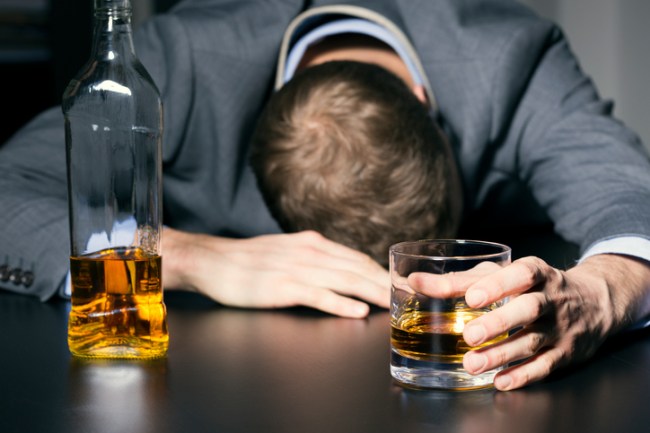
iStockphoto
There comes a time in every hardcore drunkard’s life where the words “I’ll never drink again,” will spill from their quivering lips. This knee-jerk sentiment typically emerges from that dark circle of one’s tattered soul following a relentless 24-hour-long hangover, comprised of a pounding headache, the pukes and a vicious bout of touch-and-go diarrhea. “My God, they finally got me,” you might hear them cry out from the floor of the crapper. “I’ve been poisoned by the government. They were never going to let me live.” But that drunken knave didn’t actually get caught up in some super secret CIA mission that led to his assassination. That’s just the perils of heavy drinking.
Alcohol can be a lot of fun and fuel some rather exceptional times, but there is a savage side to the bottle that has a way of bringing even the most professional drinker to his knees every once in a while. Because of this, there are often situations where that one guy in your crew, you know the one who puts everyone else to shame with his ability to suck down shots like a freaking terminator, may look you all dead in the eyes and say, “That’s it, boys, it’s over. I’m never touching the stuff again.”
But then, a few days after vowing to get sober, something frightening happens to the poor bastard. He starts to exhibit signs of sickness – like an alley cat that has survived for the past month on spoiled Hamburger Helper and bleach water. He is dawned with the appearance of a half-dead dead zombie reject that should probably be put down to prevent all of humanity from catching whatever vile plague has infected his guts. I mean, what would happen to society if this wicked beast finds his way outside?
The situation gets worse. The guy starts complaining of a headache, the chills and he gets overly aggressive when someone accuses him of having AIDS. Then he curls up on the bathroom floor, gripping his stomach, screaming, “I’m gonna hurl!”
Everyone in the house freaks out. “Grab the shotgun,” some redneck can be heard yelling in the distance.
But whoa! Let’s not kill the miserable slob just yet. His behavior is not likely a contagious affliction that threatens the sanctity and safety of everyone in his immediate vicinity. Your buddy is probably suffering from alcohol withdrawal syndrome.

iStockphoto
It is unfortunate, but some people who hit the bottle a little too hard on a regular basis can endure some extreme withdrawal symptoms when they attempt to stop drinking. But this unpleasant reaction to alcohol detoxification does not grab every drinker by the boo-boo in the same way. Some poor schlubs actually have a genetic predisposition for the condition, according to a recent international study from Yale University.
Researchers have identified variants in the SORCS2 gene that apparently make it harder for some people to detox from alcohol than others. Genetic makeup is “responsible for about half of the risk” of developing this crushing disorder, according to findings published in the journal Alcoholism: Clinical and Experimental Research.
Of course, the sickness associated with trying to stop drinking can make it more difficult for those in desperate need of a booze break.
“Alcohol takes more lives in the United States every year than opioids, but there are few effective treatments to help people who have an alcohol use disorder,” Andrew H. Smith, lead author of the study, said in a statement. “For people who experience intense withdrawal symptoms, that’s one more barrier they have to face while trying to reduce unhealthy alcohol use.”
Interestingly, the study shows that alcohol withdrawal syndrome can be rather severe in about one in ten people who possess the variants. But this only appears in white folks. African Americans were not shown to carry the variant that leads to this disorder.
This unmerciful condition can be worse than most hangovers, but it will eventually pass. The roughest of the battle typically occurs within the first two to three days from the time of the last drink. But the condition should be taken seriously. Health experts say that anyone experiencing mild to severe withdrawal symptoms should consider it a medical emergency. Some withdrawal symptoms, while only temporary, can bring about troubles with the heart. It’s just best to detox until medical supervision.
And while getting off the bottle may not sound appealing, there may come a time when it is necessary for the betterment of one’s overall wellness. Alcohol is the leading cause of preventable liver disease in the world. It is a malady that some health experts say can happen after just 10 years of hard drinking. Cirrhosis of the liver, the final state of the liver quivers, claims approximately 35,000 lives every year. Hell, that’s what killed Slayer guitarist Jeff Hanneman just five years ago. And if booze can take out someone as metal as that dude, what chance do the rest of us really have?
So, take it easy out there, kids!
*****
Mike Adams is a freelance writer for High Times, Cannabis Now, and Forbes. You can follow him on Facebook, Twitter, and Instagram.